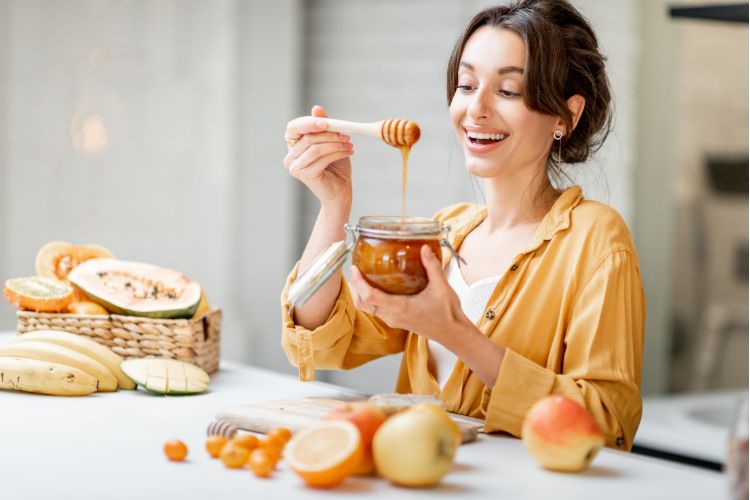If you’ve ever felt like you might be addicted to sugar, you are not alone. When eating sugar in its natural form, it may be beneficial. But, overconsumption of added sugars can be additive and feel down right impossible to do without. When it comes to our health, understanding the impact of added sugar vs natural sugar is extremely important. We’ve all heard about cutting back on sugar but not all sugars are created equal. That’s why understanding the difference between added and natural sugars and how to kick sugar cravings is extremely important to your health.
Could Our Sweet Tooth Be a Life Saver?
From a primitive hunter-gatherer perspective, the taste of sweet was a built-in survival mechanism. Natural sugar that is found in fruits and vegetables is a rich energy source. The naturally occurring sugars, combined with nutrients and fiber, provided sustained energy for primitive man. Since periods of food shortages and fasting was common in primitive times, having a “sweet tooth” may have been beneficial by triggering people to seek out high-energy, sweet tasting foods. It’s no mistake that nature produces more of these sweet foods during summer and fall since any excess calories consumed will be stored as fat. This fat storage ensures survival during those cold winter months when food was scarce. During this time, humans were able to “dine in”. In other words, they were able to work off of their internal fat reserves to sustain energy and life. However, in our modern-day society, our “sweet tooth” tends to get us in a bit of trouble.
Why Do We Crave Sugar?
Sugar and sugary foods are powerful when it comes to stimulating the production of dopamine. Dopamine makes us feel good and is released during pleasurable situations, but it also plays a role in addiction as well. In addition, the hormone serotonin is also released when eating sugar. Serotonin makes us feel happy and our brains are hardwired to feel pleasure and happiness. But, because sugar is so readily available, the drive for more dopamine and more serotonin can lead to a sugar addiction that can have serious consequences for our health.
Quantity and Quality
First, there’s the problem of quantity and the abundance of sugar in most convenient foods. Usually, abundance is a good thing and most people in modern cultures have an abundance of food and calories. The trouble is that it’s extremely easy to overeat and consume too many calories from sugar that are ultimately stored as fat. Since almost any food is now available year-round, we don’t experience those long primitive winters of food shortages which lead to periods of fasting and burning up the stored fat reserves from summer and fall. The excess and large quantities that are now available, has resulted in people getting sugar any time they need a boost of energy and another shot of happy hormones. It has also resulted in a large percentage of our population suffering from excessive sugar cravings, obesity, and diabetes.
Benefits of Natural Sugar
The second major factor when it comes to sugar is the quality. Natural sugars found in vegetables such as sweet potatoes or bell peppers, in season fruits like berries, melons, apples, and citrus, and in raw honey, have other health benefits as well. Fruits and vegetables contain a variety of vitamins and minerals and are high in fiber which slows down the uptake of sugar into the blood stream. Raw honey is a good source of antioxidants, contains minerals such as magnesium, zinc and potassium and it has antibacterial and antifungal properties that may help protect against candida infections in the intestines. Raw honey is a beneficial prebiotic, meaning that it feeds the good bacteria that lives in our intestines. Sipping on a cup of warm water or herbal with a spoonful of honey is a good elixir for soothing a sore throat and, while studies are limited, honey has been used in some cultures to treat digestive issues including diarrhea.
Dangers of Added Sugar
On the other hand, added sugars, sugars that are highly processed and abundant in processed foods, do not contain the health benefits of natural sugars. Processed sugars come under many names making it difficult to spot them in the list of ingredients on packaged foods. What you can look for to identify added sugar is any ingredient that ends in “ose”. These sugars include sucrose, dextrose, fructose, maltose, glucose, and one of the most damaging sugars…high fructose corn syrup. In addition, look for syrups, nectars and even ingredients that may seem innocent like “beet sugar”. Beet sugar is extracted from beets which when eaten in it’s whole form is a very healthy food. Beet sugar is a cheap source of highly processed sugar that will quickly raise blood sugar levels and result in a fast insulin response. Your much better off to just eat the beet and avoid beet sugar. Added sugars including but not limited to cane sugar, date sugar, fruit juice concentrate, maltodextrin, and malt syrup do not contain the beneficial fiber and nutrients of natural sugars. Overconsumption can potentially lead to fatty liver disease, diabetes, increased cholesterol, heart disease, and dementia. Dementia is now known as type 3 diabetes as an effect of chronic insulin resistance, plus insulin deficiency which negatively impacts the brain. Protect your brain and overall health by avoiding added sugar.
How Can You Stop the Sugar Cravings?
So now that we understand the difference between added sugar verses natural sugar and its impact on our health, how can we stop those powerful sugar cravings? While sugar cravings can feel impossible to resist, they don’t have to be. Here are a few tips to release you from the bonds of sugar cravings and addiction:
- Eat a combination of protein, high fiber carbohydrates, and fat with each meal and snack. Meals should include a protein source such as meat, poultry, fish, cottage cheese, or whole milk yogurt, high fiber vegetables and fruit and a bit of healthy fat. Nuts are a perfect snack in that they include a balance of protein, fiber, carbohydrates, and fat all by themselves. Alternative snacks include a handful of almonds with an apple, berries with plain whole milk yogurt, or celery with peanut or almond butter. Eating balanced snacks and meals will keep you full longer and reduce cravings.
- Drink plenty of water. One of the reasons we crave sweets is because we need more fluid in our bodies. In nature, sweet fruits are also high in water. Our bodies are called to sweet foods when we are in fact dehydrated. Drink 8 to 12 glasses of water daily depending on your body size and your activity level.
- Distract yourself. Find ways to get away from tempting foods. Go for a walk at lunch time. Bring your healthy snack to work and avoid the lunch room buffet of cookies and donuts.
- Remove and replace. Remove all of the sugary tempting foods from your kitchen. Replace them with fresh natural sugar sources such as fresh fruit, vegetables, and honey.
- Download the “Ultimate Sugar Detox Cheat Sheet”! There is no need to suffer with sugar addiction and sugar cravings. This FREE cheat sheet has everything you need to detox from sugar and kick the sugar habit fast and easily. Grab your copy today and get started.





